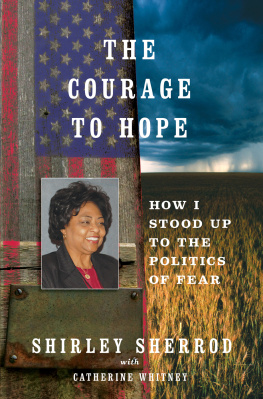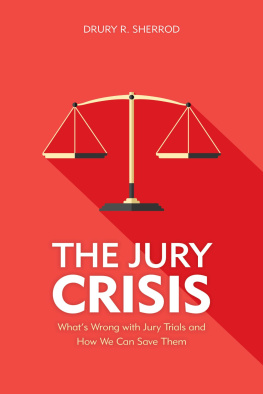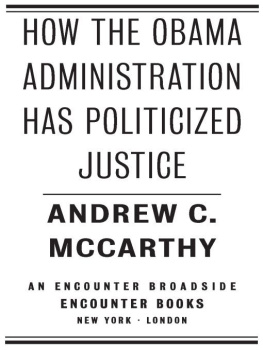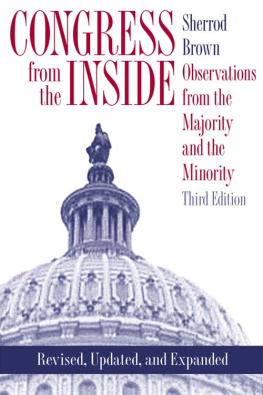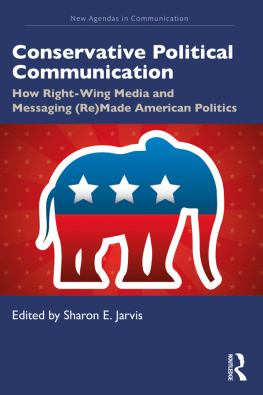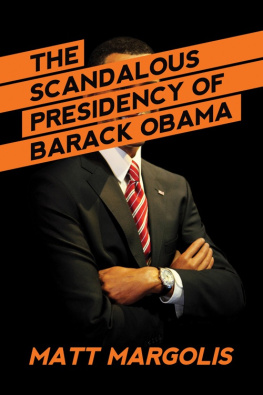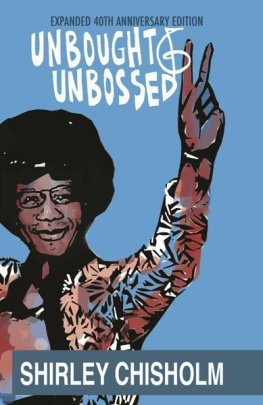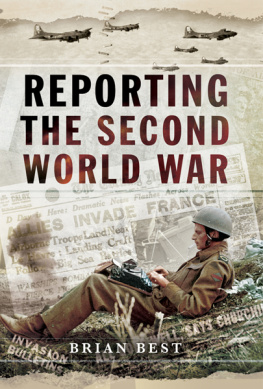Thank you for purchasing this Atria Books eBook.
Sign up for our newsletter and receive special offers, access to bonus content, and info on the latest new releases and other great eBooks from Atria Books and Simon & Schuster.
C LICK H ERE T O S IGN U P
or visit us online to sign up at
eBookNews.SimonandSchuster.com
God helped me to see that its not just about black people. Its about poor people. And Ive come a long way. I knew that I couldnt live with hate, you know. As my mother has said to so many, If we had tried to live with hate in our hearts, wed probably be dead now. Ive come to realize that we have to work together.
SHIRLEY SHERROD, SPEECH AT NAACP, MARCH 27, 2010
Contents
For my parents, Hosie and Grace Miller
And, as always, for Charles

The White House Wants You Out
I nterstate 75 cuts a jagged path down the center of Georgia, a busy highway where caravans of massive trucks haul their loads through the South day and night. I had driven that highway hundreds of times, traveling to Athens, where my office was, or to Atlanta. In my role as Georgia state director of rural development for the U.S. Department of Agriculture (USDA), I logged many hours of driving every week.
My practice was to spend Monday through Friday in the field and return to my home in Albany, in the southwest corner of the state, for the weekend. I usually enjoyed the ride, especially in the summer. Even when I was tired, it was my time to be alone with my thoughts, to reflect, to prepare to ease back into family life. I kept the air conditioner humming and the music on low. My phone was hooked up to a hands-free system so I could easily make or receive calls. There was always some emergency or another to address, and I liked to stay available.
But on Monday, July 19, 2010, my quiet journey was interrupted by the dark interior cloud that gripped me as I put my shaking hands to the wheel and headed for home.
Earlier that day I had been over in West Point, a tiny town on the far western edge of the state, on the Chattahoochee River, for was hard to find, the rural struggle was about to be eased substantially with the opening of a Kia plant. The textile mills that had supported this part of Georgia for most of the century had long since been shuttered and moved to Mexico and overseas, and Kia was throwing a lifeline to a dying community. When the company announced it was opening a plant in West Point, it was as miraculous as the resurrection itself. There would be ten thousand jobs from the plant and suppliers, with an estimated ten thousand more from supporting businesses. Our agency had helped the city prepare for the opening, and the city manager was going to take us over there for a tour after lunch as a way of saying thanks. We were feeling quite celebratory that day.
However, just as we were about to leave for the plant, my secretary notified me that Cheryl Cook, my boss in Washington, would be calling me and I should stand by. I told the others to go on without me and sat down to wait for Cheryl.
I had some idea of what she wanted. Behind my cheerful smile, I had been struggling with a growing personal crisis. For the last few days, my BlackBerry had been inundated with angry calls from all over the country. They were very ugly, and I was forced to listen to a steady stream of hate coming through the hands-free system as I drove.
had come the previous Thursday while I was sitting in a meeting in Atlanta. It was an e-mail on my BlackBerry that read, You ought to be ashamed of yourself. Working for the government and refusing to help white farmers, and then bragging about it to the NAACP.
I was shocked, and I could only guess at what the personI couldnt tell if it was a man or a womanwas talking about. A couple weeks earlier, I had given a speech to the Coffee County NAACP, but my message had not been that I wouldnt help white farmers; it had been the opposite. I had used the story of rescuing the farm of a man named Roger Spooner in 1986 as an example of how we needed to let the wounds of the past heal and reach out and help each other. I immediately texted the e-mailer back, explaining my message, and got the response It looks like someone misrepresented your words.
That was for sure! My speech had been about healing and togetherness. I had felt so clear about the necessity of taking off our blinders and letting the light shine in, even when it was hard to face.
* * *
Sixty-three-year-old Roger Spooner was beaten down when he walked into my office at the Federation of Southern Cooperatives/Land Assistance Fund in 1986.
Although the Federation had originally been organized to help black farmers keep their land, we regularly had white farmers approach us for various things. But that was the first time a white farmer had ever come to me for help saving his land. I offered Mr. Spooner a seat. I could see he was trying hard to maintain his pride, and I figured he must have felt uncomfortable to be talking to me about his problems. Relations between blacks and whites were still fragile in 1980s Georgia. There was a common attitude of Well take care of our kind, and you take care of your kind. Mr. Spooner began by speaking loudly, and at first I thought he was acting superior to me, but I later found out he was hard of hearing and he always talked like that. We stared uneasily at each other across the desk, and then, haltingly, he began to tell me his story. He and his wife, Eloise, had a family farm they were on the brink of losing. I learned that the Spooners were two weeks away from their farm being sold at the courthouse, and someone had suggested they come to see me as a last-ditch effort.
I looked at the worried man sitting across from me, and my heart just opened up wide. I had a revelation. I said, I can help you. And I did. It took plenty of maneuvering, but my efforts succeeded, and the Spooners and I ended up being solid friends.
I told that story to the NAACP audience, describing it as an emotional breakthrough for me, because my work had always been with black farmers, but, as I told the audience, God helped me to see that its not just about black peopleits about poor people. And Ive come a long way. I knew that I couldnt live with hate, you know. As my mother has said so many times, If we had tried to live with hate in our hearts, wed probably be dead now.
While I spoke, the room was hushed as the audience listened intently. It was a very powerful moment for many of us who had come through the trials of segregation and chosen not to hate. But obviously someone had decided to twist the message.
Before days end, I had several more e-mails, and I forwarded the correspondence to Cheryl. She was a good boss, a no-nonsense veteran of rural development jobs, and I trusted her to be my advocate. I suggested that she get a copy of the tape of my entire speech, in case the department had to respond. I assumed I would get their help on this, but for the next few days the e-mails and voice mails on my BlackBerry continued, becoming increasingly virulent, and nothing was being done.
By then I knew that the instigator was a blogger named Andrew a small selectively edited clip of my speech that Monday morning that made it look as if I was saying the exact opposite of what I said. I was being accused of reverse racism. I could not believe it. That wasnt me at all! Breitbart had also tweeted, Will Eric Holders DOJ hold accountable fed appointee Shirley Sherrod for admitting practicing racial discrimination?
Next page
